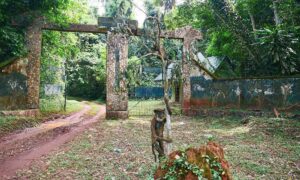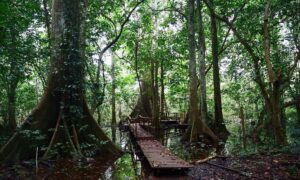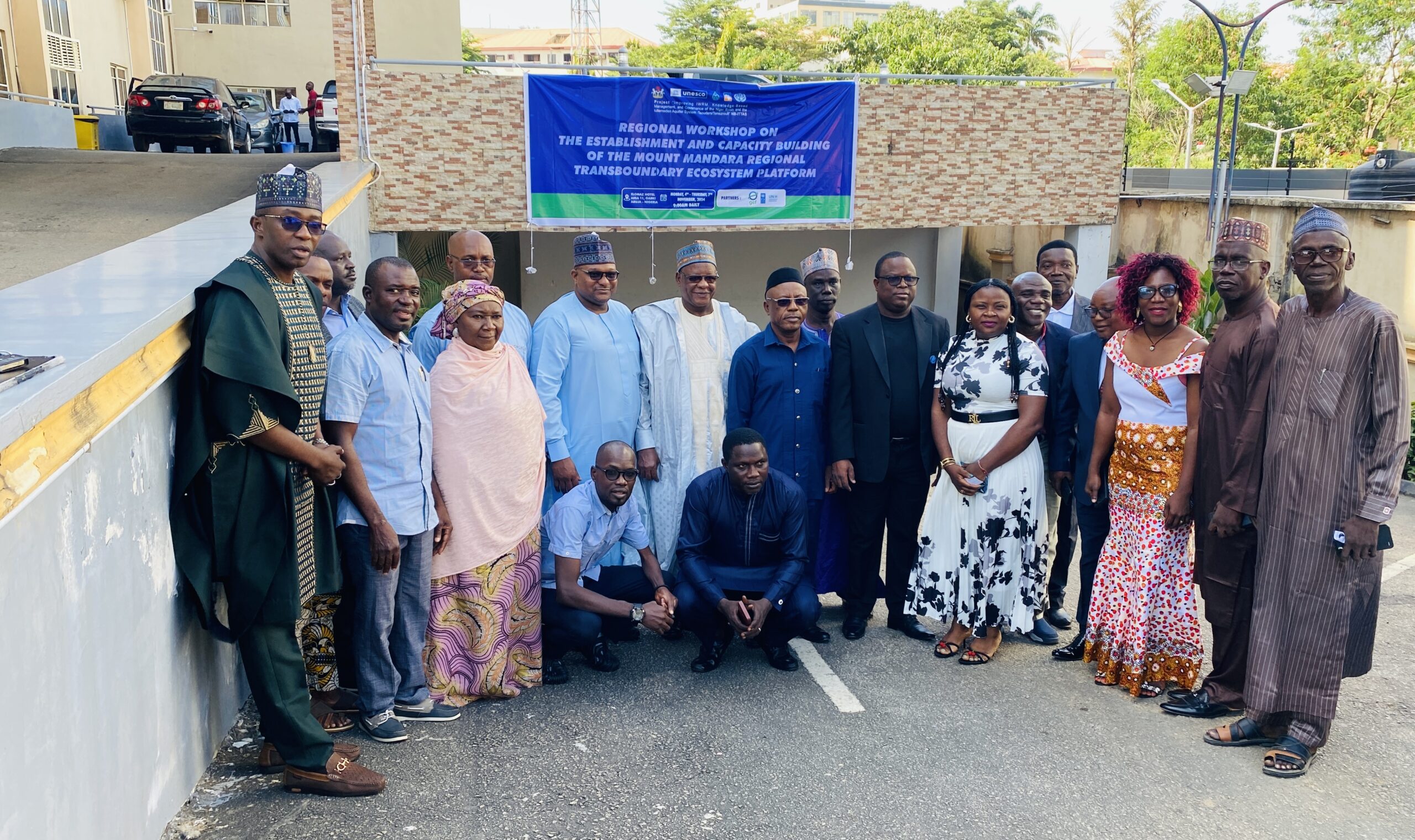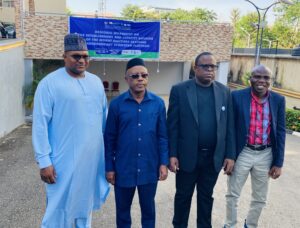Restoring Okomu National Park’s integrity for eco-tourism development
By Usman Aliyu, News Agency of Nigeria (NAN)
Okomu National Park, a biodiversity gem nestled in the Ovia South West Local Government Area of Edo, had long suffered the required attention.
In spite of its values to national development in tourism sector, concerned citizens note that illegal logging, poaching, and encroachment by farmers once threatened its rich ecosystem, home to the endangered African forest elephant and the white-throated monkey — one of the world’s rarest primates.
In a bid to secure the park, the Okomu National Park Service (NPS) and the Africa Nature Investors (ANI) Foundation, collaborated to restore the park’s integrity.
The collaboration, which began in 2022, is not just about conservation; it is a holistic effort to secure the park, empower surrounding communities, and foster eco-tourism development.
From reinforcing security through ranger recruitment to initiating community-driven alternative livelihoods, the partnership is redefining conservation in the country.
In spite of its vast ecological significance, the the 200-square kilometre protected area, designated as a national park in 1999, has struggled with illegal activities inimical to its values.
Reports from conservation groups have highlighted how timber merchants exploited the forest for its valuable hardwood, while poachers targeted endangered species for bushmeat and illicit trade.
A 2020 study by the Nigerian Conservation Foundation (NCF) revealed that widespread deforestation within the park was driven by commercial interests, with criminal syndicates felling ancient trees and smuggling timber to international markets.
In addition, the unchecked hunting of wildlife, including elephants and primates, pushed several species to the brink of local extinction.
“The threats to Okomu were enormous; when I resumed duty in November 2022, illegal logging was a major challenge, and we had to find a sustainable solution”, Mr Lawrence Osaze, the Conservator of Park, observed.

Recognising the urgent need for intervention, the National Park Service sought partnerships with conservation organisations that had a proven track record of success.
This led to the involvement of the Africa Nature Investors (ANI) Foundation, which had demonstrated effective eco-tourism and conservation models in Gashaka Gumti National Park in Taraba and Adamawa.
The partnership between ANI Foundation and Okomu National Park began in 2022, and within two years, significant progress had been made in tackling the park’s longstanding problems, Osaze noted.
He said that one of the foundation’s first actions was to enhance the park’s security infrastructure.
“ANI Foundation hired and trained 38 additional rangers, equipping them with modern surveillance tools and deploying them for regular anti-poaching patrols. This move drastically reduced illegal logging and wildlife hunting.
“We joined forces together, and the story today is entirely different. The park is relatively peaceful, and logging activities are at the barest minimum.
“Before the partnership, rangers were often outnumbered and under-resourced, making it difficult to curb illegal activities. But ANI’s intervention has transformed the situation.
“The foundation has not only provided financial and logistical support but has also introduced intelligence-driven security measures, ensuring that poachers and loggers face swift consequences.

“Beyond enforcement, the foundation recognised the importance of winning over local communities. Many of the park’s challenges stemmed from economic hardship, as nearby villagers relied on the forest for survival.
To address this, ANI introduced several empowerment initiatives, encouraging residents to adopt sustainable livelihoods.
“We have had a series of engagements with communities to gain their support. We are working to ensure they do not rely solely on forest resources for survival”, Osaze explained.
He noted further that the initiatives included savings and loan programmes for women and youth, enabling them to establish small businesses, expand their farms, or invest in alternative sources of income.
Similarly, the Iyase of Udo, Chief Patrick Igbinidu, a respected traditional ruler in the area, said that the impact of these interventions was evident.
“ANI Foundation has been a great partner since they arrived at Okomu National Park. They have not only improved security but have also empowered our people. Many of our youths have been employed as rangers, and women have been supported with interest-free loans,” he said.
According to him, these programmes have been instrumental in shifting local perceptions of conservation.
He also said that communities viewed the national park as a government-imposed restriction on their livelihoods, but now, they could see it as an opportunity for economic growth and stability.

By most accounts, Okomu National Park is one of Nigeria’s most important biodiversity hotspots, hosting species that are rarely found elsewhere.
ANI Foundation, meanwhile, prioritises protecting these species to promote eco-tourism as a sustainable revenue model for the park.
Peter Abanyam, ANI Foundation’s Project Manager for Okomu, emphasised the park’s ecological importance.
“Okomu is the primary home of the white-throated monkey. Apart from a small population in south-western part of the country, this park is where you find them in the world. The African forest elephant is also a flagship species here,” he noted.
By boosting conservation efforts, Abanyam insisted that the foundation would attract both domestic and international tourists, positioning Okomu as an eco-tourism destination.
According to the project manager, plans are underway to upgrade park facilities, improve visitor experiences, and market Okomu as a must-visit site for nature lovers.
Both the National Park Service and ANI Foundation acknowledge that long-term success will depend on maintaining vigilance against illegal activities while expanding alternative livelihood programs.
“Our goal is to make Africa’s nature and wildlife a source of pride. We want to show that conservation can be sustainable and beneficial to local communities through private sector investment,” Abanyam said.
Amidst the sustainable efforts, the Iyase of Udo, also reaffirmed the community’s commitment to the partnership.
“We will continue to support ANI and the National Park Service. They have shown a genuine interest in developing our area, and we stand with them,” he said.
Observers note that for Osaze and his team, the vision is clear. It is to make Okomu National Park Nigeria’s premier eco-tourism hub, a model for conservation success across the country.
They note further that the transformation of Okomu National Park is a testament to the power of strategic partnerships in conservation.
According to them, by combining security reinforcement, community engagement, and eco-tourism development, the collaboration between ANI Foundation and the National Park Service is setting a new standard for environmental protection.
What was once a forest under threat is now a beacon of hope for conservationists, researchers, and nature lovers alike, they note.
Stakeholders in tourism industry also agree that if sustained, Okomu model could be replicated in other national parks across the country, ensuring that the country’s rich biodiversity is preserved for future generations.
As efforts continue to safeguard Okomu’s natural heritage, one thing is clear. When conservation is done right, it benefits not just the environment but also the people who depend on it, stakeholders believe. (NANFeatures)







 He added that such projects would directly benefit communities by reducing erosion and promoting sustainable land use.
He added that such projects would directly benefit communities by reducing erosion and promoting sustainable land use.